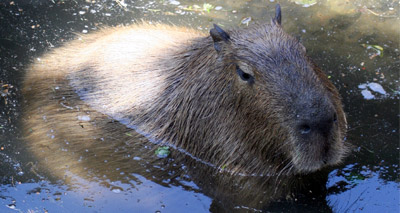
Results will help the Scottish Government decide on the future of beavers in Scotland
Scottish Natural Heritage have published six reports which look at the trial reintroduction of beavers at Knapdale in Argyll.
The reports consider the health of the beavers and their effect on woodland, aquatic plants, scheduled monuments and public health, as well as the socio-economic costs and benefits of the trial.
The beavers were released in May 2009 by the Scottish Wildlife Trust and The Royal Zoological Society of London. Over five years, Scottish Natural Heritage (SNH) and its partners closely monitored the beavers and the effects on their environment. The results are expected to help the Scottish Government decide on the future of beavers in Scotland.
Work by the Univeristy of Stirling revealed that beavers have had an effect on aquatic plants in some of the lochs, showing a taste for white water lily and water horsetail, with a particular preference for common club rush and great fen-sedge.
The woodland study, run by the James Hutton Institute, showed that the beavers had gnawed or felled 8.6 per cent of tress in the area as a whole by early 2014. Most of this activity was within 10km of the water's edge.
The socio-economic impact of the trial was assessed by Scotland's Rural College, who found that visitor numbers and volunteering in the area have had a boost. The benefits also extended beyond the trial area and included a range of activities held throughout Scotland, such as education sessions, events, talks and walks.
The three other reports were published by independent monitoring partners.
Project Manager of the Scottish Beaver Trial, Simon Jones, said: “The monitoring phase of the five-year study came to a close in May 2014, so we are pleased to now see the findings from the independent scientific monitoring programme, co-ordinated by Scottish Natural Heritage, being published. The key findings here will be put to the Scottish Government, with hopefully a Ministerial decision on the future of beavers in Scotland being reached by the end of 2015.”
Field Operations Manager for the Scottish Beaver Trial, Roisin Campbell-Palmer, said: “We welcome the process moving forward. The reports published by SNH highlight many of the benefits of this keystone species, such as increasing wetland habitat in the area, boosts to visitors and volunteering in the trial area and the beaver being utilised as an educational opportunity across Scotland.”
Online copies of the reports are available at: http://www.snh.gov.uk/protecting-scotlands-nature/reintroducing-native-species/scottish-beaver-trial/the-monitoring-programme/



 The Veterinary Medicines Directorate (VMD) is inviting applications from veterinary students to attend a one-week extramural studies (EMS) placement in July 2026.
The Veterinary Medicines Directorate (VMD) is inviting applications from veterinary students to attend a one-week extramural studies (EMS) placement in July 2026.